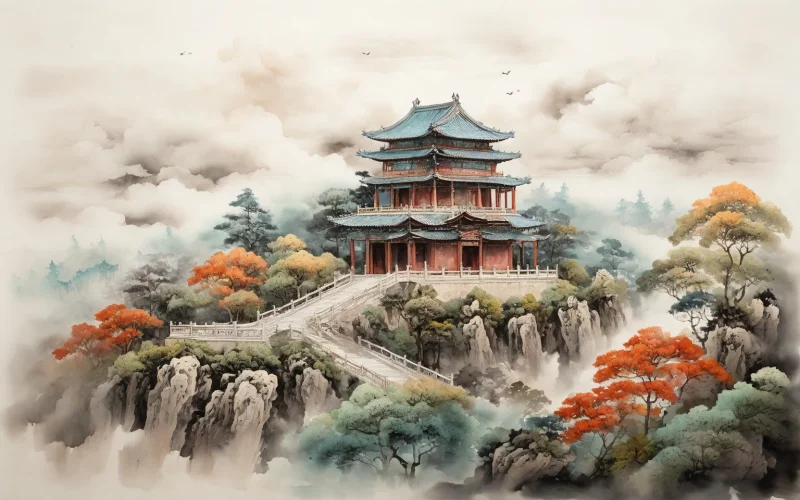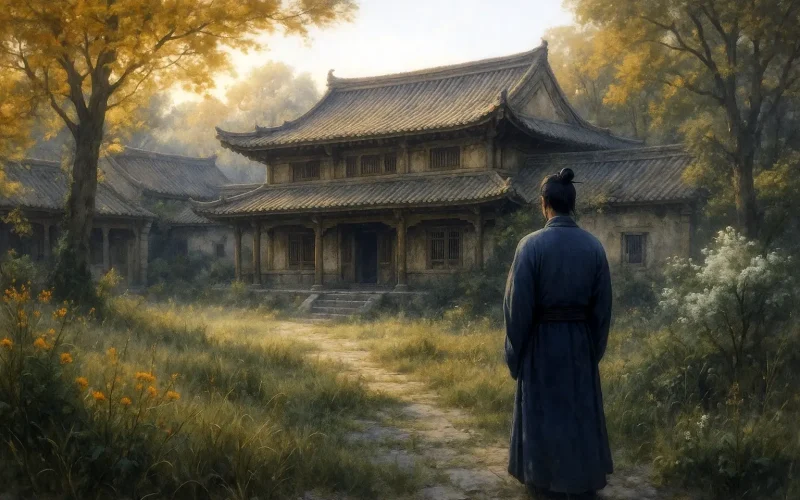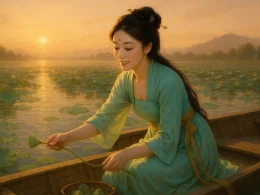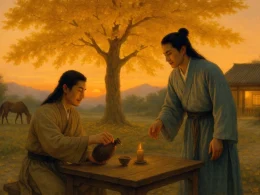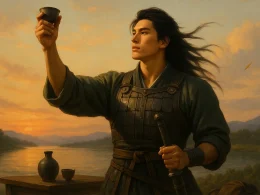The dragon coils and tiger crouches amid the trees;
The sky-scraping imperial tomb can't but fall down.
The hill's still green with grass when blows the autumn breeze,
But the passers-by worship only the new crown.
Original Poem
「途经秦始皇墓」
许浑
龙盘虎踞树层层,势入浮云亦是崩。
一种青山秋草里,路人唯拜汉文陵。
Interpretation
This poem by Tang dynasty poet Xu Hun depicts his passage by the tomb of Qin Shi Huang, offering a pointed historical comparison between the First Emperor and Emperor Wen of Han. Through their contrasting legacies—Qin's tyranny versus Han's benevolence—the poet critiques the nature of power and governance.
First Couplet: "龙盘虎踞树层层,势入浮云亦是崩。"
Lóng pán hǔ jù shù céng céng, shì rù fú yún yì shì bēng.
Dragon-coiled, tiger-crouched, trees rise tiered and high,
Summit piercing clouds—yet destined still to die.
The opening couplet renders the mausoleum's imposing grandeur ("dragon-coiled, tiger-crouched") only to undercut it with "destined to die." The single character "崩" (collapse) shatters the illusion of permanence, symbolizing history's inevitable judgment on tyranny.
Second Couplet: "一种青山秋草里,路人唯拜汉文陵。"
Yī zhǒng qīng shān qiū cǎo lǐ, lù rén wéi bài hàn wén líng.
Same green hills, same autumn grass,
Passersby bow at Han Wen's tomb en masse.
This devastating contrast reveals historical verdict: though both rulers rest in similar landscapes, only Emperor Wen—the paragon of benevolent rule—receives spontaneous reverence. The people's silent choice between tombs becomes the ultimate critique of governance.
Holistic Appreciation
Xu Hun transforms a roadside observation into a profound meditation on power's legacy. The first couplet's architectural magnificence ("summit piercing clouds") collapses under the weight of its moral emptiness, while the second couplet's quiet scene—ordinary travelers paying respects to a different grave—delivers history's quiet rebuke. More than comparing two emperors, the poem establishes an eternal metric: true memorialization springs not from forced awe but earned respect.
Artistic Features:
- Vivid Imagery Contrast: The poet deliberately selects two sets of imagery - "dragon-coiled, tiger-crouched" versus "autumn grass and green mountains" - to create a striking visual contrast between the majestic Qin mausoleum and the modest Han tomb. This juxtaposition of spatial imagery not only shows their physical differences but also metaphorically represents two diametrically opposed governing philosophies.
- Subtle yet Profound Emotional Expression: While avoiding direct criticism, the poem conveys deep meaning through precise word choice. The character "崩" (collapse) brilliantly combines the dual meanings of physical structure crumbling and political authority disintegrating. The phrase "唯拜" (only pay respects) powerfully expresses people's historical judgment through their spontaneous actions.
- Concise yet Profound Historical Commentary: The seven characters "势入浮云亦是崩" (summit piercing clouds yet destined to collapse) succinctly summarize the historical inevitability of tyrannical regimes' downfall. The depiction of different historical treatments in the same natural environment ("一种青山") reveals the eternal truth that "those who win people's hearts win history." This expression of historical perspective is remarkably penetrating.
- Meticulous Artistic Structure: The first couplet emphasizes the grandeur of Qin's mausoleum while the second shifts to describe the ordinary scene of Han's tomb, creating a structure that builds up then tones down. Within the unified setting of "green mountains and autumn grass," the people's selective act of "only paying respects" highlights historical evaluation differences, demonstrating superb artistic conception.
- Exquisite Language Refinement: The word "崩" (collapse) describes both the tomb's physical state and the regime's collapse; the word "唯" (only) in "唯拜" emphasizes the exclusivity of choice. The poet skillfully uses vocabulary with multiple connotations to embed rich historical reflection in concise language.
- Effective Symbolic Technique: The entire poem elevates specific tomb landscapes into symbolic representations of historical judgment. Qin's mausoleum "piercing clouds" symbolizes his grandiose ruling style, while Han's tomb amidst "autumn grass" represents his recuperative governance approach. This symbolic description gives the poem universal significance beyond specific historical facts.
Insights
This compact masterpiece distills a timeless truth: lasting honor derives not from monumental tombs or terrified submission, but from governance that earns its people's voluntary reverence. Tyranny may dominate its era, but history's verdict belongs to benevolence. Xu Hun's quiet observation at these neighboring tombs reminds all who wield power—ancient or modern—that true legacy is written not in stone but in the collective memory of those who live under its shadow. The poem's enduring power lies in letting the landscape itself pronounce judgment: the unvisited grandeur versus the frequented humble mound become moral compass points for all societies.
About the poet
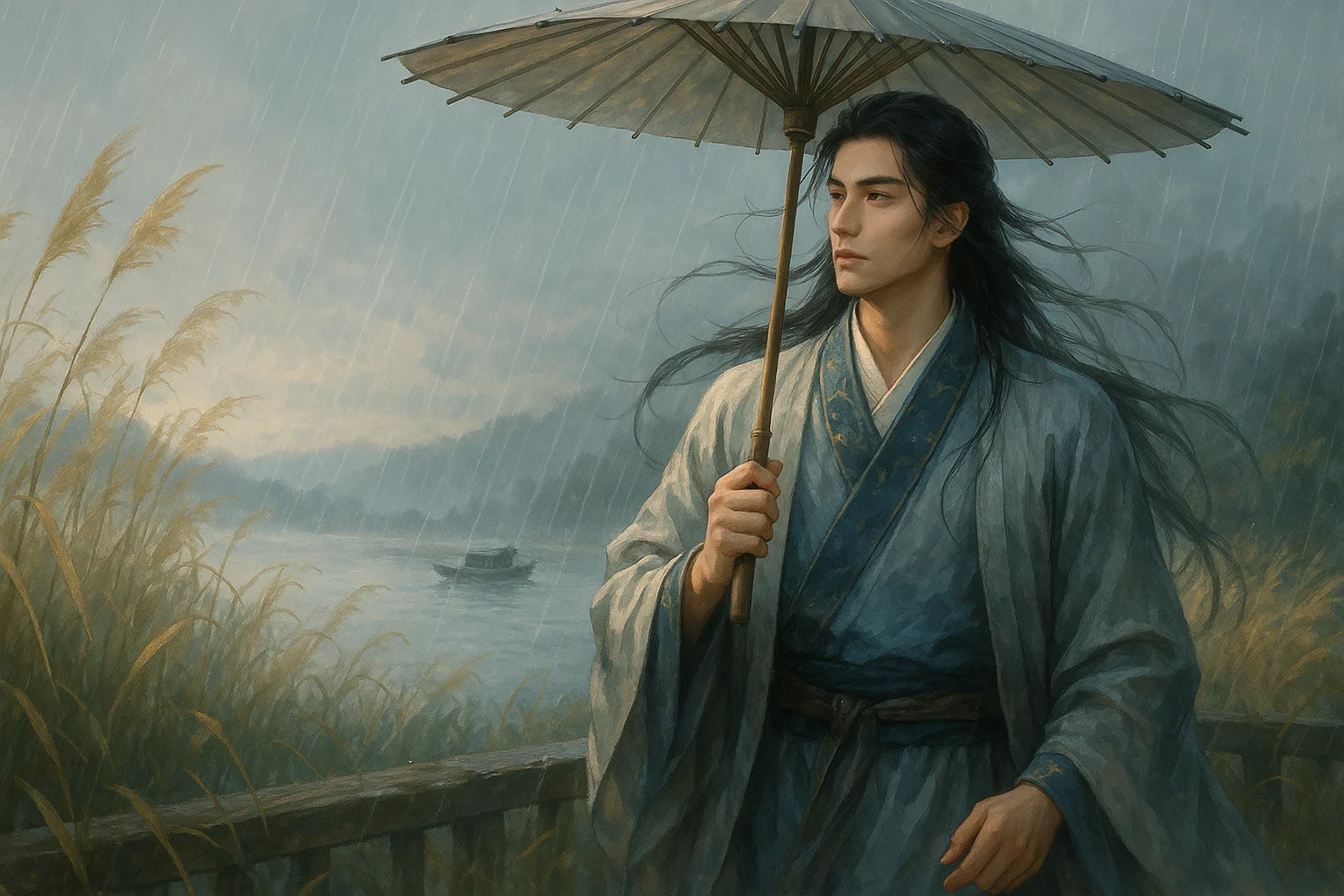
Xu Hun (许浑), c. 791 - 858 AD, was a Tang Dynasty poet, a native of Danyang, Jiangsu Province. He was one of the most influential poets of the Late Tang Dynasty. His poems are characterized by nostalgia for ancient times and idyllic poems, in which he describes the scenery of water and rain.






